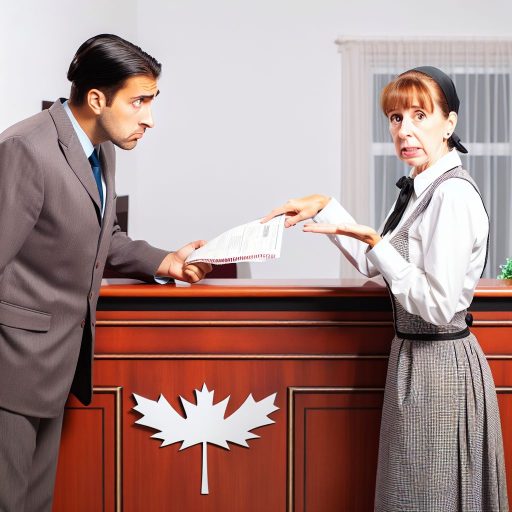Understanding the Role of a Spa Manager in Canada
Overview of Responsibilities
A spa manager oversees daily operations in a spa environment.
This role includes managing staff and ensuring customer satisfaction.
Additionally, the manager develops marketing strategies to attract clients.
They also manage budgets and control expenses effectively.
Communication skills are crucial for coordinating with stakeholders.
Key Skills Required
To excel, a spa manager must possess strong leadership abilities.
Effective organizational skills are essential for smooth operations.
Moreover, customer service skills enhance client interactions.
A good understanding of spa treatments creates credibility with guests.
Financial acumen aids in managing the spa budget wisely.
Importance of Industry Knowledge
Knowledge of current spa trends is vital for success.
Staying informed about new techniques can attract clients.
Furthermore, understanding wellness and health trends enhances service offerings.
Networking within the industry opens opportunities for collaboration.
Continuous education through workshops addresses skill gaps.
Career Path and Progression
A career as a spa manager usually starts with entry-level positions.
Common roles include spa coordinator or therapist.
Gaining experience in these positions is essential before advancement.
Many managers hold relevant qualifications in hospitality or management.
Experience in customer service can also support career growth.
Educational Requirements and Certifications for Aspiring Spa Managers
Understanding Educational Background
A degree in business administration can significantly enhance your qualifications.
Many employers prefer candidates with a background in hospitality management.
Moreover, specialized training in cosmetology or massage therapy proves beneficial.
Consider programs that offer hands-on experience in managing spa operations.
Essential Certifications
Obtaining a spa management certification can set you apart from other candidates.
Unlock Your Career Potential
Visualize a clear path to success with our tailored Career Consulting service. Personalized insights in just 1-3 days.
Get StartedOrganizations like the International Spa Association offer valuable certifications.
Additionally, consider earning CPR and first aid certifications for added safety assurance.
Importance of Continuing Education
Continuing education keeps you updated with industry trends and practices.
Many spas encourage employees to attend workshops and seminars.
Online courses on business management can be flexible and informative.
Networking opportunities at these events can also provide valuable insights.
Gaining Practical Experience
Internships at local spas can offer practical experience and networking prospects.
Entry-level positions provide a good foundation in daily operations.
Shadowing a current spa manager helps you understand the role better.
Involvement in customer service roles enhances your people skills significantly.
Building Professional Connections
Joining professional organizations related to the spa industry is beneficial.
Attend trade shows and conferences to meet industry leaders.
These connections can help you find job opportunities.
Networking with peers can lead to mentorship experiences.
Key Skills and Attributes Needed to Succeed as a Spa Manager
Leadership Abilities
Effective spa managers exhibit strong leadership skills.
They inspire their team to deliver exceptional service.
Moreover, they create a positive work environment.
This skill fosters collaboration and unity among staff.
Excellent Communication Skills
Communication is vital in spa management.
Managers must interact with clients and staff clearly.
They should listen actively to understand client needs.
Additionally, they provide constructive feedback to employees.
Organizational Skills
Strong organizational abilities are essential.
Spa managers coordinate multiple tasks daily.
They handle scheduling, inventory management, and budgeting.
This skill ensures smooth operations in the spa.
Customer Service Focus
Exceptional customer service is a core attribute of successful managers.
They prioritize client satisfaction at all times.
Furthermore, they address complaints promptly and effectively.
This commitment builds long-lasting client relationships.
Business Acumen
Understanding business principles is crucial for spa managers.
They should grasp finance, marketing, and human resources.
Strong business acumen drives profitability for the spa.
Additionally, it helps in making informed strategic decisions.
Knowledge of Spa Treatments
A solid knowledge of spa treatments enhances managerial effectiveness.
Managers should stay updated on industry trends and techniques.
Having this expertise builds credibility with staff and clients.
Furthermore, it aids in identifying training needs for employees.
Problem-Solving Skills
Effective spa managers possess strong problem-solving abilities.
They analyze situations quickly and develop solutions.
This skill helps to address challenges as they arise.
Moreover, it contributes to maintaining a calm atmosphere.
Find Out More: How to Become a Successful Casino Host in Canada
Gaining Experience in the Spa and Wellness Industry
Exploring Entry-Level Positions
Start your journey by seeking entry-level roles in spas.
Positions such as receptionist or spa assistant provide essential exposure.
These roles help you understand daily operations firsthand.
Moreover, you will interact with clients and staff regularly.
This experience builds foundational knowledge in the industry.
Consider Educational Opportunities
Invest in certifications that enhance your qualifications.
Look for programs in esthetics, massage therapy, or spa management.
Reputable institutions offer courses tailored for aspiring spa managers.
Additionally, these programs often include practical training.
Hands-on experience strengthens your skill set significantly.
Networking in the Industry
Attending industry events can broaden your professional network.
Meet spa professionals and potential mentors at trade shows.
Involvement in local wellness groups also proves beneficial.
Building relationships opens doors for future opportunities.
Furthermore, these connections can provide valuable industry insights.
Gaining Diverse Experience
Consider working in various spa settings for broader exposure.
Every establishment has unique practices and client demographics.
Additionally, seek internships that expand your practical skills.
Hands-on training in different environments builds versatility.
This adaptability is highly valued in management roles.
Seeking Mentorship
Identify potential mentors within the industry.
Approach seasoned professionals for guidance and advice.
A mentor can offer insights into navigating career obstacles.
Moreover, they can provide recommendations for further growth.
Building a rapport with a mentor can greatly enhance your journey.
Find Out More: Essential Tools and Technology for Modern Concierges
Networking and Building Industry Connections in Canada
Utilizing Local Events
Attend local trade shows and conferences in the spa industry.
Engage with professionals and enthusiasts alike at these events.
Take advantage of workshops to enhance your skills and knowledge.
Make it a point to follow up with new contacts after events.
Consider joining local spa and wellness associations for more opportunities.
Leveraging Social Media Platforms
Utilize platforms like LinkedIn to connect with industry leaders.
Share relevant articles and insights to showcase your expertise.
Join industry-specific groups to expand your network further.
Engage with posts and comment thoughtfully to build relationships.
Regularly update your profile to reflect your achievements.
Building Professional Relationships
Identify mentors who can provide guidance in your career journey.
Stay in touch with former colleagues and classmates regularly.
Attend networking meetups to connect with fellow spa managers.
Offer your support and help others whenever possible.
Remember, relationships in the industry can open new doors.
Participating in Volunteer Opportunities
Volunteer at wellness fairs or spa-related charitable events.
Engage with the community while gaining valuable experience.
Meet potential contacts in a more relaxed, informal setting.
Showcase your dedication to the industry through your volunteer work.
Consider working with local spas to gain hands-on experience.
Following Up and Maintaining Connections
After meeting someone, reach out to thank them for their time.
Maintain regular contact through emails or social media.
Share updates about your professional developments periodically.
Invite connections for coffee or lunch to strengthen relationships.
Consistency in communication is key to lasting connections.
Explore Further: Insider Tips for Becoming a Professional Sommelier

Exploring Job Opportunities
Where to Look for Spa Manager Positions
Finding spa manager positions requires strategic searching.
Start by exploring online job boards.
Websites like Indeed and Glassdoor offer numerous listings.
Another great resource is LinkedIn.
Many spas post job openings on their company pages.
Networking can also uncover hidden job opportunities.
Engage with industry professionals in local events.
Join spa and wellness-related groups on social media.
Consider visiting local spas directly.
Leaving a resume can sometimes lead to interviews.
Utilizing recruitment agencies can streamline your search.
Specialized agencies cater to the hospitality and wellness sectors.
Research local health and wellness expos.
Such events often have opportunities for employment.
Do not overlook classified ads in local newspapers.
These can sometimes contain unique job listings.
Lastly, check with spa management schools.
They often have job placement services for graduates.
You Might Also Like: Sustainable Practices In Spa Management
Understanding Regulations and Compliance in the Canadian Spa Industry
Overview of Regulatory Bodies
In Canada, the spa industry is regulated by various bodies.
These entities ensure that spas operate safely and legally.
Health Canada oversees regulations related to health and safety standards.
Province-specific agencies manage local compliance requirements.
Licensing Requirements
Spas must obtain appropriate licenses to operate legally.
Each province has its own licensing regulations.
For instance, Ontario requires specific certifications for spa professionals.
Ensure you research local regulations prior to opening a spa.
Health and Safety Standards
Health and safety are paramount in the spa industry.
Spas must adhere to strict hygiene and sanitation guidelines.
Regular inspections help maintain these standards.
Additionally, staff must be trained in first aid and CPR.
Employment Regulations
Understanding employment laws is crucial for spa managers.
Each province has its own labor laws regarding workplace safety.
It’s vital to ensure compliance with wage and hour laws.
Staff training on employee rights enhances workplace morale.
Environmental Regulations
Environmental compliance is increasingly important in the spa industry.
Spas must manage waste disposal and chemical usage responsibly.
Following provincial and federal environmental guidelines is essential.
Implementing eco-friendly practices can enhance your spa’s reputation.
Staying Updated on Regulations
The regulatory landscape can change frequently.
Stay informed about new compliance requirements and industry standards.
Joining industry associations can provide valuable resources.
Networking with other spa professionals can also keep you informed.
Continuing Education and Professional Development for Spa Managers
Importance of Continuing Education
Continuing education is crucial for spa managers in Canada.
It helps them stay updated with industry trends and regulations.
Moreover, education enhances their management and leadership skills.
Types of Continuing Education
Various pathways exist for furthering education in spa management.
Workshops and seminars offer practical knowledge and hands-on experience.
Additionally, certification programs provide credibility and advanced skills.
Online courses allow flexibility while learning at one’s pace.
Professional Associations and Resources
Joining professional associations offers valuable networking opportunities.
Organizations like the Canadian Spa Association provide resources and support.
They also offer access to exclusive training and events.
Staying Updated with Industry Trends
Participating in industry conferences helps managers stay informed.
These events showcase the latest trends and innovations in the spa sector.
Furthermore, reading industry publications can provide ongoing insights.
Mentorship and Networking
Establishing a mentorship relationship can be highly beneficial.
Experienced professionals provide guidance and share best practices.
Networking with peers can lead to collaboration and new opportunities.
Importance of Practical Experience
Hands-on experience is invaluable for developing managerial skills.
Working in various spa roles can provide comprehensive insights.
Additionally, securing internships can enhance practical understanding.
Empowering Spa Managers through Education
Continuing education and professional development are essential.
These avenues empower spa managers to excel in their careers.
Ultimately, ongoing learning contributes to personal and professional growth.
Additional Resources
Honua Kai hotel vs owner units – Maui Forum – Tripadvisor
Hotel Reservations | Book Hotel Rooms Online – Hyatt Hotels …




